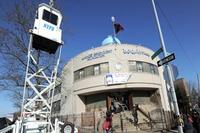-
New report highlights unfulfilled recommendation by 9/11 Commission

New report says that failure to enact one of the key recommendations of the 9/11 Commission – consolidated congressional oversight of DHS – poses a risk to U.S. national security. “While the failure to reform DHS oversight may be invisible to the public, it is not without consequence or risk. Fragmented jurisdiction impedes DHS’ ability to deal with three major vulnerabilities: the threats posed by small aircraft and boats; cyberattacks; and biological weapons,” one of the report’s authors says.
-
-
New study shows link between rates of gun ownership and homicides
A new study shows that U.S. states with higher estimated rates of gun ownership experience a higher number of firearms-related homicides. The study, covering thirty years (1981-2010) in all fifty states, found a “robust correlation” between estimated levels of gun ownership and actual gun homicides at the state level, even when controlling for factors typically associated with homicides. For each 1 percentage point increase in the prevalence of gun ownership, the state firearm homicide rate increases by 0.9 percent, the authors found.
-
-
California granting driver's licenses to illegal aliens threatens homeland security: critics
Last Thursday night’s approval of AB 60 by both houses of the California Legislature, granting driver’s licenses to illegal aliens, poses a serious threat to the security of all Americans, critics charge. The critics say that in 2005, in response to recommendations by the 9/11 Commission, Congress enacted the REAL ID Act in order to discourage state governments from issuing driver’s licenses and other identity documents to illegal aliens – and that California’s AB 60 is designed to circumvent requirements of REAL ID Act.
-
-
Nigerian terrorist to be extradited to U.S.

Nigeria is set to extradite Lawal Babafemi, also known as Abdullah Ayatollah Mustapher, to the United States to answer terrorism charges. Babafemi was paid $8,600 by AQAP to recruit English speaking Nigerians to work in AQAP’s English-language media network, al-Malahem, which includes a magazine titled Inspire.
-
-
Obama: Russia’s chemical weapons proposal may be a “significant breakthrough”
President Obama on Monday described a Russian proposal for Syria to turn over control of its chemical weapons to international monitors in order to avoid a military strike a “potentially positive development,” which could represent a “significant breakthrough.” Obama said, though, that the proposal should be taken “with a grain of salt,” and it was viewed with some skepticism by the administration, with senior officials saying the proposal could possibly be a delaying tactic aimed to undermine Obama’s already tenuous efforts to push for a military strike. The Russian proposal called for Syria to open its chemical weapons stocks to international inspections and give complete account of its stocks; begin the process of supervised destruction of these weapons; and join the Chemical Weapons Convention.
-
-
Rebels capture historic Christian town

Maaloula, located about forty miles northeast of Damascus, is a small town of about 3,300 residents, famous mostly for the fact that it is one of three places (the other two being two villages nearby) where western Aramaic – the language spoken by Jesus, even though his dialect was different — is still spoken. Most of the town’s residents are Melkite Greek Catholic and Orthodox Christians, so the fact that it was sitting in the middle of rebel-held territory was a source of unease for its mostly pro-regime residents. Over the weekend, anti-regime rebels had taken over the town — and many Christians in Syria watched the battle for the town nervously, as they have been watching other gains by the rebels, fearing that the alternative to Assad’s regime would be far less tolerant of minority religions. These worries about the Sunni-led rebellion against Assad have caused large segments of Syria’s minority communities to continue to support the Assad regime.
-
-
U.S. pays growing attention to insider threats
Al Qaeda and other terrorist organizations have repeatedly sought to infiltrate the U.S. intelligence community by having supporters apply for intelligence jobs, according to a classified budget document. The U.S government investigates thousands of employees a year to make sure such infiltration does not happen. The CIA says that 20 percent of job applicants whose backgrounds raised questions had “significant terrorist and/or hostile intelligence connections.”
-
-
“Climate Change, Water Conflicts, and Human Security” report released
Increasingly, climate change and the associated increase in the frequency of extreme weather events such as floods, droughts, and rising sea level, are acknowledged as not only having humanitarian impacts, but also creating national and regional political and security risks. While people and governments can adapt to these impacts, their capacity to do so varies.
-
-
Pentagon expands Syria attack plan
The Obama administration, in an effort to mobilize American public opinion to support a strike against Syria, has stressed that any military action would be limited in scope, but the Pentagon is preparing for a longer, and broader, campaign of bombardment of Syria than it originally had planned. The plan includes heavy missile strikes which will be followed by second and third waves of bombing of targets which were not initially destroyed or sufficiently damaged. The plan calls for the use of cruise missiles and aircraft from a U.S. Navy aircraft group in the Red Sea, and long-range bombers from outside the theater.
-
-
Syria’s chemical weapons stocks will not be attacked
Military analysts say Syrian president Bashar Assad will emerge with Syria’s chemical arsenal intact if the United States executes a limited airstrike. The United States contemplates a punitive strike in response to Syria’s use of chemical weapons against Sunni civilians on 21 August – and on about a dozen earlier occasions – but the U.S. attack, if it comes, is not likely to include the depots where the chemical weapons are stored because such an attack may release deadly gases which would cover the neighboring areas with toxic clouds, potentially creating a human and environmental disaster.
-
-
NYPD designated all NYC mosques as terrorist organizations to facilitate broad surveillance

The New York Police Department (NYPD) secretly labeled entire mosques in New York as terrorist organizations, allowing the NYPD to use surveillance techniques including informants and spies without needing evidence or proof of criminal or terrorist activities to investigate the mosques. The investigations, known as Terrorism Enterprise Investigations (TEI), began after the 9/11 attacks on New York City and the Pentagon.
-
-
Flexible vehicle-arrest system stops cars involved in crime, terrorism

Researchers have developed a mathematical model that could help engineers design a flexible vehicle-arrest system for stopping cars involved in criminal activity or terrorism, such as suspect car bombers attempting break through a check point, without wrecking the car or killing the occupants.
-
-
Budget cuts force changes in CIA’s document declassification policy
Sequestration-mandated budget cuts forced the CIA to close its Historical Collections Division office, which declassifies historical documents. Instead, the division’s responsibilities will be transferred to the office that handles Freedom of Information Act (FOIA) requests. “This is very unfortunate,” said Robert Jervis, a Columbia University professor who chairs the CIA’s Historical Review Panel. “There will be fewer releases. We shouldn’t fool ourselves.”
-
-
Worries grow about Syria’s biological weapons capabilities, intentions
The debates among experts in Western and Middle Eastern intelligence services and militaries about the use of chemical weapons by the Assad regime revolve around how many times Assad has used chemical weapons, not whether such weapons were used. Neighbors of Syria have become increasingly alarmed – and, in private, have expressed their anxiety in discussions with the United States – about another illicit Syrian WMD program: biological weapons. The readiness of the Assad regime to use one proscribed weapon – chemicals — has led to growing unease among Syria’s neighbors that the regime may not find it too difficult to violate other weapon-related taboos. Biological weapons could give the Assad regime an effective means of retaliation because, if the weapon is well-designed, the lethal contents would spread easily without leaving tell-tale signs about the origin of the attack – or even evidence that there has been an attack.
-
-
Jewish Federations’ security arm stresses awareness on High Holidays
Security awareness should be a primary consideration for synagogues during the High Holidays, the security arm of the national Jewish community said. Synagogue staff, security volunteers and greeters should be on the lookout for suspicious persons or activity around their facilities, particularly during services and other gatherings,” the Secure Community Network (SCN) said in a statement posted Wednesday on its Web site, hours before the start of Rosh Hashanah.
-
More headlines
The long view
Factories First: Winning the Drone War Before It Starts
Wars are won by factories before they are won on the battlefield,Martin C. Feldmann writes, noting that the United States lacks the manufacturing depth for the coming drone age. Rectifying this situation “will take far more than procurement tweaks,” Feldmann writes. “It demands a national-level, wartime-scale industrial mobilization.”
No Nation Is an Island: The Dangers of Modern U.S. Isolationism
The resurgence of isolationist sentiment in American politics is understandable but misguided. While the desire to refocus on domestic renewal is justified, retreating from the world will not bring the security, prosperity, or sovereignty that its proponents promise. On the contrary, it invites instability, diminishes U.S. influence, and erodes the democratic order the U.S. helped forge.
Fragmented by Design: USAID’s Dismantling and the Future of American Foreign Aid
The Trump administration launched an aggressive restructuring of U.S. foreign aid, effectively dismantling the United States Agency for International Development (USAID). The humanitarian and geopolitical fallout of the demise of USAID includes shuttered clinics, destroyed food aid, and China’s growing influence in the global south. This new era of American soft power will determine how, and whether, the U.S. continues to lead in global development.
Water Wars: A Historic Agreement Between Mexico and US Is Ramping Up Border Tension
As climate change drives rising temperatures and changes in rainfall, Mexico and the US are in the middle of a conflict over water, putting an additional strain on their relationship. Partly due to constant droughts, Mexico has struggled to maintain its water deliveries for much of the last 25 years, deliveries to which it is obligated by a 1944 water-sharing agreement between the two countries.
How Disastrous Was the Trump-Putin Meeting?
In Alaska, Trump got played by Putin. Therefore, Steven Pifer writes, the European leaders and Zelensky have to “diplomatically offer suggestions to walk Trump back from a position that he does not appear to understand would be bad for Ukraine, bad for Europe, and bad for American interests. And they have to do so without setting off an explosion that could disrupt U.S.-Ukrainian and U.S.-European relations—all to the delight of Putin and the Kremlin.”
How Male Grievance Fuels Radicalization and Extremist Violence
Social extremism is evolving in reach and form. While traditional racial supremacy ideologies remain, contemporary movements are now often fueled by something more personal and emotionally resonant: male grievance.
